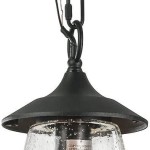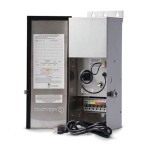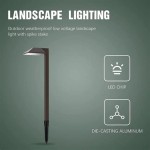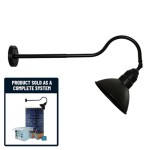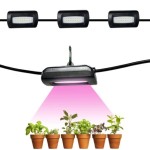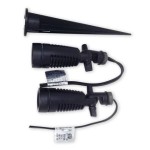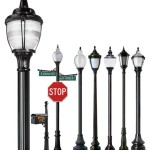Photo Eye Sensor for Outdoor Lights: A Comprehensive Guide
Photo eye sensors, also known as light-sensitive switches, are essential components for automating outdoor lighting systems. They work by detecting changes in ambient light levels, turning lights on automatically at dusk and off at dawn. This article will delve into the intricacies of photo eye sensors, exploring their mechanisms, benefits, types, and considerations for choosing the right one for your outdoor lighting needs.
Understanding the Mechanism
Photo eye sensors operate based on the principle of photoconductivity. They utilize a semiconductor material, typically cadmium sulfide (CdS), that exhibits a change in electrical resistance when exposed to varying light intensities. When the light level drops below a predetermined threshold, the sensor's resistance increases, triggering the activation of the connected lights. Conversely, when the light level rises above the threshold, the resistance decreases, turning the lights off.
The sensor's internal circuitry consists of a light-sensitive element, a comparator, and a relay. The light-sensitive element converts variations in light intensity into electrical signals. The comparator compares the signal against a reference voltage, determining whether the light level is above or below the threshold. Finally, the relay switches the circuit, turning the lights on or off based on the comparator’s output.
Advantages of Photo Eye Sensors
Photo eye sensors offer several advantages over traditional manual switching methods, making them a preferred choice for outdoor lighting applications:
- Energy Efficiency: By automatically turning lights on only when needed, photo eye sensors significantly reduce energy consumption, contributing to cost savings and environmental sustainability.
- Convenience and Safety: Eliminating the need for manual operation, photo eye sensors provide convenience for homeowners and renters, ensuring lights are always on when necessary. Furthermore, they enhance safety by illuminating pathways and deterring potential criminals during nighttime hours.
- Increased Security: The automatic activation of lights serves as a deterrent against burglary and vandalism, creating a sense of security and dissuading potential intruders.
Types of Photo Eye Sensors
Photo eye sensors are available in various types, each tailored to specific applications and requirements.
1. Dusk to Dawn Sensors
The most common type, dusk to dawn sensors, are designed to activate lights at dusk and turn them off at dawn. These sensors are particularly useful for illuminating walkways, driveways, and outdoor spaces that require consistent lighting throughout the night.
2. Time Delay Sensors
Time delay sensors offer a customizable feature that allows users to adjust the duration for which lights remain on after the sensor detects darkness. These sensors are ideal for applications where a short period of light is sufficient, such as illuminating a porch or a backyard for a brief period.
3. Motion-Activated Sensors
These sensors combine light sensitivity with motion detection, activating lights only when motion is detected within a specific range. Motion-activated sensors are highly effective for security purposes, illuminating areas only when needed, saving energy and enhancing security.
4. Astronomical Sensors
Astronomical sensors use a built-in clock and GPS signals to precisely determine sunset and sunrise times, activating lights based on these astronomical events. These sensors are particularly useful for applications where precise light activation timing is crucial, such as street lighting or public spaces.
Considerations for Choosing a Photo Eye Sensor
Choosing the right photo eye sensor for your outdoor lighting needs involves considering several factors:
1. Light Sensitivity Settings
Photo eye sensors come with adjustable light sensitivity settings, allowing users to customize the activation threshold based on the desired level of darkness. Consider the ambient light conditions in your area and adjust the sensitivity accordingly.
2. Mounting Location
Proper mounting location is crucial for optimal performance. Choose a location with clear visibility and minimal obstructions to ensure the sensor accurately detects changes in light levels.
3. Weather Resistance
Outdoor applications require weather-resistant photo eye sensors. Look for sensors with a high IP rating, indicating their resistance to water and dust ingress.
4. Load Capacity
Ensure the sensor's load capacity matches the wattage of the connected lights. Overloading the sensor can lead to malfunction or damage.
5. Warranty and Support
Consider the manufacturer's warranty and available support services when choosing a photo eye sensor. A reliable warranty and responsive support team provide peace of mind and ensure long-term performance.
Photo eye sensors play a crucial role in automating outdoor lighting systems, offering numerous benefits for homeowners and businesses. By understanding the various types, features, and considerations for choosing the right sensor, you can ensure optimal performance and reap the advantages of automated lighting solutions.

Hardwire Post Eye Light Control With Photocell Automatic Sensor Switch Ledwholers

Post Eye Light Control With Photocell Sensor Outdoor True Value

Hardwire Post Eye Light Control With Photocell Automatic Sensor Switch Ledwholers

Tork Black Swivel Mount Photocell Eye Motion Light Sensor Adapter Hardwired Culus Safety Listed Energy Saving 120v In The Adapters Department At Com

Woods 59408wd Outdoor Hard Wired Post Eye Light Control With Photocell Sensor Com
/product/19/9342352/1.jpg?strip=all)
915 Generation Dusk To Dawn Sensor 2 Packs Photocell Light For Outdoor Lighting 120 277v Photoelectric Switch Replacement Jumia

Photocell Indoor Outdoor Post Eye Light Control 120v

China Photo Eye Sensor For Wall Pack Led Light Jl 102a Factory And Manufacturers Chiswear

Dusk To Dawn Outdoor Post Eye Electric Resistor Photocell Light Control Sensor

Outdoor Hard Wired Post Eye Light Control With Photocell Sensor Cyantek Led Lighting
Related Posts
